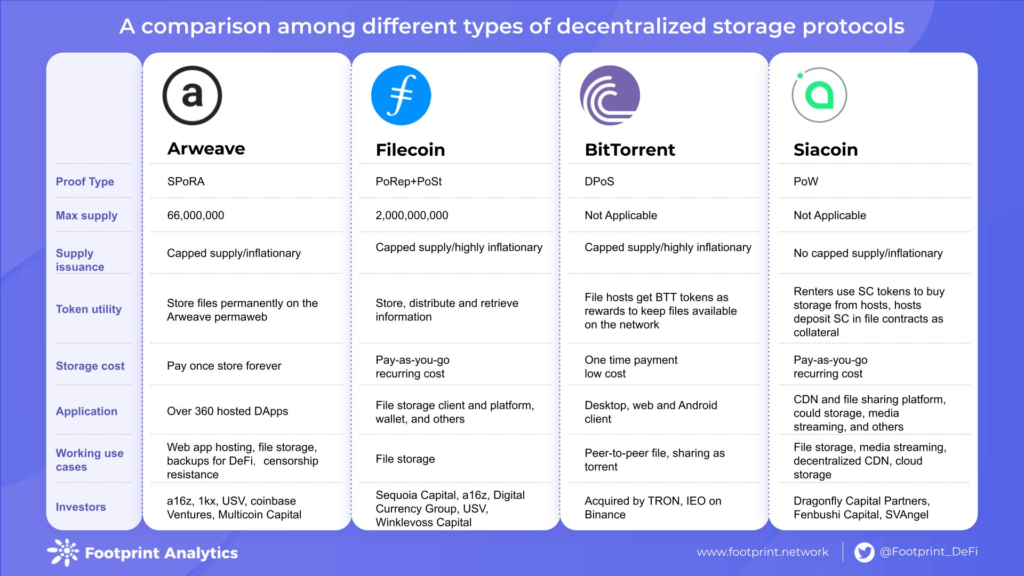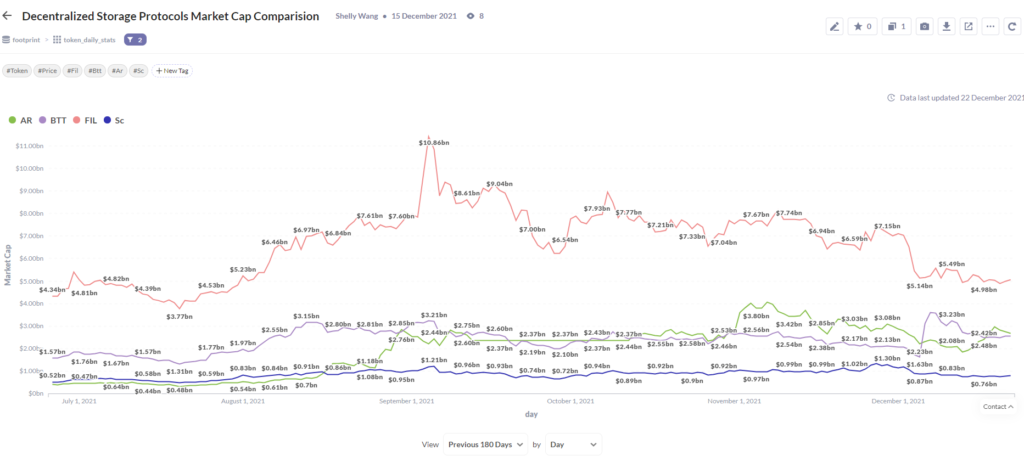Will decentralized storage protocols overtake the cloud storage market?
According to IDC’s “Global Enterprise Infrastructure Quarterly Tracker: Buyer and Cloud Deployment” report, the global cloud storage market is expected to reach more than $100 billion in size between 2020 and 2025.
While centralized cloud storage solutions are the mainstream cloud storage technology, they have plenty of drawbacks.
Frequent data leaks, server failures, centralized operational control, and hacking incidents have triggered more and more developers to think about how to store data in a safe, stable, and low-cost way.
The development of blockchain technology provides a new opportunity for decentralized storage services.
What is decentralized storage protocol?
Based on blockchain technology, decentralized storage protocols introduce an incentive system to its ecosystem with a tokenomics model to realize distributed and piecewise data storage on multiple network nodes.
There are two major categories of decentralized storage protocols.
One uses storage as arithmetic power, and users mine by providing hard disk space. This consensus mechanism is benchmarked against Bitcoin-type projects, and the representative project is Siacoin.
The other one is storage as a service, providing adequate storage as arithmetic power—the user completes the data storage service for mining. The representative projects are Filecoin, Arweave, and BitTorrent.
Why are decentralized storage protocols needed?
Reliability
Blockchain is a simple digital ledger of transactions that is replicated and distributed throughout the network of computer systems. Building on the blockchain, a cloud storage protocol has the characteristics of decentralization and encrypted storage, and it builds a reliable and decentralized data storage mechanism.
In the decentralized storage protocol, all data blocks are verified. Workers must verify any data deposited, modified to prevent data tampering.
Distributed storage technology systems achieve load balancing and prevent traffic from concentrating in a single location, reducing the speed of data storage and retrieval. Since they store multiple copies of the original data in various locations, users do not suffer any data loss even if anyone machine fails or stops working.
Security
For security, each copy of data is encrypted, sliced, and stored with multiple redundancies in nodes across the network. Only the private key can get the data, decrypt it, and view it with digital currency. And because the data is stored decentralized, any intruder trying to hack into these storage nodes will only get a portion of the data, not the entire data file.
Scalability
The number of decentralized storage nodes is infinitely scalable, and each node can flexibly adjust the storage capacity and quality according to its resources.
Fairness
With the emergence of millions of decentralized nodes, the market will be more competitive and open. Powerful centralized storage providers cannot control the cost of data storage, which will enable fairer pricing for the entire storage service market and promote nodes to improve the quality of storage services.
Comparison of four decentralized storage protocol projects and data performance
Decentralized storage protocols are an effective complement to cloud storage. In the Web 3.0 era, where data security and user data ownership are more critical, its reliability, security, scalability, and fair market pricing will continue to attract more companies, especially blockchain companies.
Footprint Analytics summarizes a side-by-side comparison using Arweave, Filecoin, BitTorrent, and Siacoin as project representatives.

According to Footprint Analytics, the token market cap performance of the above four projects is as follows:
- Filecoin still holds the leading position of decentralized storage protocols.
- Arweave, which became the Solana blockchain data storage protocol in August, has seen its token price climb rapidly, and its market cap is on par with BitTorrent token BTT.
- Siacoin, on the other hand, has been a mediocre performer, unable to gain a breakthrough.
- In general, the development of decentralized storage protocols is still relatively slow.

Summary
Decentralized storage protocols are an effective complement to cloud storage. In the Web 3.0 era, where data security and user data ownership are more important, its reliability, security, scalability, and fair market pricing will continue to attract more companies, especially blockchain companies.
The curtain of the Web 3.0 revolution has just opened, and the popularity of decentralized storage still needs to be supported in terms of infrastructure, funding, talent, and social consensus.
Most decentralized storage protocols are still in the concept formation or development stage, and national policies will also influence the development of the industry. Under the premise of different national policies and market consensus, centralized storage platforms will continue to be the mainstream storage method for a certain period.
Disclaimer: The contents of this article represent the views of Footprint and are for informational purposes only, and do not constitute any investment advice.
This work is the author’s original. Please indicate the source for reprint. Commercial reproduction requires authorization from the author. Unauthorized commercial reproduction, excerpting, or use in other ways will be investigated for related legal responsibilities.
This report was brought to you by Footprint Analytics.
What is Footprint
Footprint Analytics is an all-in-one analysis platform to visualize blockchain data and discover insights. It cleans and integrates on-chain data so users of any experience level can quickly start researching tokens, projects and protocols. With over a thousand dashboard templates plus a drag-and-drop interface, anyone can build their own customized charts in minutes. Uncover blockchain data and invest smarter with Footprint.
The post Will decentralized storage protocols overtake the cloud storage market? appeared first on CryptoSlate.

